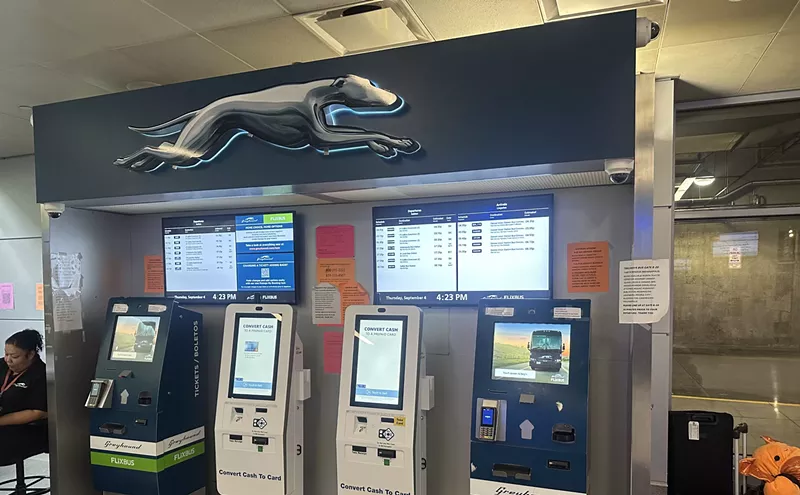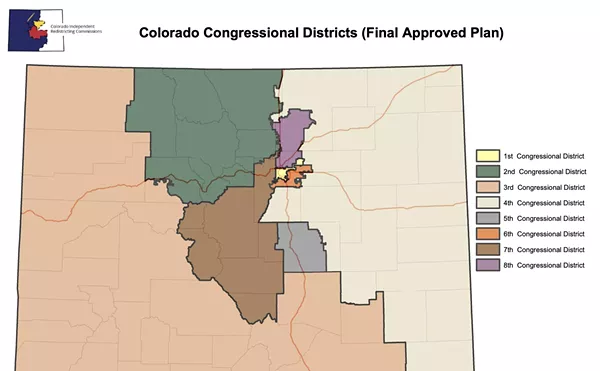"Bill Gates," Bill Gates admits, "is pretty bright. And he hasn't made any major mistakes yet. But get him into auto parts and see if he can make it. I don't think he could do it." Which is where Bill Gates of Microsoft and Bill Gates of Rocky Ford Printing Company part ways.
The whole point is that Bill Gates of Rocky Ford could be very, very rich. If he wanted to be, which he doesn't, necessarily. Instead, on this brilliantly sunny and warm September morning, he is inside an abandoned Chevrolet dealership across from the only traffic light in Rocky Ford, straddling a locomotive of a printing press and using a six-inch paint scraper to slop yellow and red and black ink, because that is exactly what he chooses to do.
It's a nice life. But before you try this at home, consider the mathematics. "Eighty percent of things are going to fail in the first three to five years," Bill Gates explains. "That's just the nature of man; there just aren't that many smart people out and around. I'm sorry, but that's the way it is."
"Bill is not a genius," explains Kathi, his wife. "But he's bright. He's a different sort--he sees things differently than most people. He has no fear, absolutely none. Even of big things. The way he sees things, so clear and simple, sometimes you'd think he was prophetic. Sometimes it comes across as arrogance."
For example: "I decided I wanted to start a magazine for entrepreneurs," begins Bill Gates. "I went to the newsstand. I mean, magazines are all over the place. So I said, geez, it's not so hard to do this. You get a computer program and some ads and put it together. It's not a moon shot. From an engineering point of view, I was totally overqualified."
"I'm no genius," he adds. "Bright, maybe."
From the masthead of Midnight Engineering, that magazine:
"ME is dedicated to those individuals interested in creating, developing, producing and distributing high technology products. The magazine is designed around the concept of a half-dozen entrepreneurial engineers sitting around having a beer."
Bill Gates, who likes beer, is an entrepreneurial engineer. Because he is interested in telling you about it, he founded Midnight Engineering, which has a worldwide circulation of somewhere between 30,000 and 40,000. The title refers to the after-hours tinkering during which entrepreneurs do their best work.
Gates publishes the magazine and edits it, too. He is the circulation manager, advertising director and layout specialist. Sometime this month he hopes to become its printer, as well. In this world of desktop publishing, that would be no big deal, except that Bill Gates bought his own press--a hundred-foot-long, cast-iron complication of rods, springs, bars and cogs that weighs as much as a house--and moved it by himself from Boston to Colorado. Where he is in the process of setting it up and running it alone. Bill Gates makes Colorado's self-promoting ranks of telecommuting "lone eagles" look like sissies.
In fact, he is currently conducting a vast economics experiment on himself, again. Here is his latest theory: Do everything yourself, all the time, even if it is running a business that normally takes a dozen or so employees. Or operating a press that usually requires four union-scale pressmen.
He calls this "extreme personal productivity." It can be a tough sell. "I can't talk to anybody about this stuff," Bill Gates says. "If I say, `I can do your job and that guy's job, too,' you're not going to be very comfortable with that. But you can do everything by yourself. It's just a matter of how you think."
For example: "`If you want it right, do it yourself'--I'd heard that for years," he says. "But nobody has ever considered doing everything. I mean everything. What if," he wonders, "you were to build a printing company, but with no employees?"
Mark Bannister, director of the Docking Institute of Public Affairs, a think tank affiliated with Fort Hays State University in Hays, Kansas, learned about Bill Gates through word of mouth. "I had heard that there was this individual guy who was a one-man operation, with an unbelievable amount of creativity and originality," he says. "Bill Gates is an incredibly unique individual."
Last year Bannister invited Gates to speak at the institute's annual economic-development conference. Gates also will attend this year's event, as a representative of the type of formerly big-city business guy who small-town boosters hope will move in and transform their burgs into beehives of economic activity.
But Rocky Mountain Printing Company and Midnight Engineering are more than successful start-up businesses, although they certainly are that. The magazine began as an obscure project written by people who understand sentences consisting mostly of numbers for people accustomed to reading sentences consisting mostly of numbers.
Since its premiere issue was mailed out six years ago, however, the magazine has evolved into something more. Increasingly, it has become a personal chronicle of Bill Gates and his sweeping economic theories. This is possible because he is only too pleased to try them out on himself and his family, then write about them. In the past two years, Midnight Engineering has practically become Gates's $4.95-per-issue diary of personal and professional growth.
Lots of people have vanity publishing projects going. The funny thing is, people seem to like this one.
From letters to Midnight Engineering, March/April 1995:
"I am absolutely ecstatic with both your magazine and your vision. In fact, I plan on including a paragraph in my will which will state that my subscription should be continued an additional ten years after my departure, whenever that occurs."
--Terry Weeder, Batavia, Ohio
Kathi Gates looks as tired as a sigh. Today her three boys are so active it seems as if the house itself is moving. One is playing with toy cars. Another is curating his iguana collection.
Outside, on a leafy street in Rocky Ford, the Gates house looks--there's no nice way to put this--like it might fall down. Scars of bare wood pock the facade. Holes and rotten wood make the approach to the front door of the hundred-year-old adobe farmhouse perilous.
Inside, though, the house is beginning to take shape. And there are some touches that hint the Gateses have had options in life. Such as Kathi's sprawling glassware collection. Or upstairs, in the hallway, an original Leroy Neiman painting of the Chicago Mercantile Exchange.
"We've lived in a lot of redwood-and-glass houses," Kathi says wistfully. "A lot of nice ones." She snaps out of it. "Fortunately, I'm very adaptable. If I weren't, I'd have to leave him. Or kill him." During the 23 years that Bill and Kathi lived in California before settling in Rocky Ford, they moved 21 times.
Bill was born in California to self-sufficient parents. After retiring from the oil-equipment business, his father built a boat and spent the next seven years sailing it around the world. "He just got in the habit of doing things the way I did," Don Gates says of his son. "Which was, I just went ahead and did them."
Bill began using power tools at seven; when he was eighteen he joined the Air Force and was sent to southeastern Colorado. One evening, as Bill walked into the bowling alley in La Junta, Kathi walked out. "It was cold out, so I said something about getting some hot chocolate," says Bill. "She said okay." Three years later, when he left the Air Force, they married.
They returned to California and Bill bought a laundromat, because he needed money to buy real estate. But he got bored and sold the business after about a year, going to work for a growing computer company called Burroughs, which was later to become Unisys.
Next he went to work for National Semiconductor, another large computer company in California. He made more money. He left the computer business and dabbled in stocks and bonds and securities for Merrill Lynch. By the second year, he was the number-two salesman on a fifty-person staff. He earned three times what he had made as an engineer. He was successful. He moved his family into a nicer house. But there was one problem: "Do you know anyone who wants to be a salesman?"
From "Entrepreneurial Lifestyle," by Bill Gates, Midnight Engineering, July/August 1992 :
"Ten years ago I had upscaled myself into such a high cost of living that any enterprise I launched would have had to become highly profitable within the first 10 minutes in order to keep me afloat. It was only marginally satisfying to have obtained my redwood and glass dream house on top of the mountains above Los Gatos, California, just down the road from millionaires like Steve Wozniak.
"It began to dawn on me that even if I worked thirty years to pay off the huge mortgage, I would still have a huge property-tax bill. So, in the early 1980s I reversed course rather dramatically."
He took a day job as a consulting engineer for a couple of start-up companies in San Francisco. It didn't quite work out--"They didn't appreciate me," he says--but never mind that. At night, Gates was pondering his first major economic theory. It went like this: Food and housing costs make up the vast majority of the household budget. What if you could cut them out almost entirely? Imagine what you could accomplish! He began to experiment on his family.
The mountain home was sold, replaced by a rental in the valley. Another move cut costs even more. Finally, in 1988, Bill decided he wanted to move to Colorado, where lower housing prices would really drive down the cost of living. Also, he liked to ski.
"We didn't really know where we were going," he recalls. "So we told the moving guy to load things up and call us when he reached Colorado."
Bill found a job as an engineer with a robotics company in Fort Collins. But that was temporary; he'd already decided the next thing he needed to do was start a magazine for people as unsatisfied and as bored as he was. It began in Bill's office, a tiny space off the bedroom. It was easy.
"I made a rate card and sent it to potential advertisers," he explains, "and I got basically no response. But since I had worked as a stockbroker, I was used to making cold calls. So I called eighty people and got eighty ads. The catch was, I gave them away. But I was able to select who the advertisers would be and make them appropriate to the magazine--I didn't have any luggage salesmen.
"Simple, right? It's all simple if you find the answer. It took me one week."
From "The Accidental Publisher," a column in the inaugural issue of Midnight Engineering, January/February 1990:
"Palladin, starring Richard Boone, was one of my favorite television programs as I was growing up. If you recall, Palladin was a wealthy San Francisco gentleman, circa 1880. The opening scene each week showed him in a gentleman's club receiving a wire from someone in distress. Changed from his elegant attire, he rode off into a completely different, and more adventurous, life for some period. Clearly, Palladin needed a challenge. He had wealth, and to make more money was only an incremental gain...
"I don't know the first thing about publishing a magazine. At any rate, I hope you enjoy it and will subscribe. I really don't want to go back to work at a regular job."
Bill Gates printed 5,000 copies of the first issue of Midnight Engineering. Publishing the second issue was even easier. Half the advertisers decided to stay on and pay for their space. By the end of the first year, the number of advertisers canceling their ads was roughly equal to the number of businesses calling Bill to ask for space in his magazine. He stopped soliciting ads and hasn't done so since.
It was during the early days of Midnight Engineering that Bill formulated his next big economic theory, the concept of "extreme personal productivity," which he discovered in a minor panic.
"The first issue of Midnight Engineering," he explains, "took three months, from September 1989 to December 1989. But then it dawned on me as I was basking in my first issue that this was a bi-monthly. In other words, I only had two months to do three month's work.
"So it only took me two months. After a year I got it down to forty days. So what was I doing? I was creating time, just by brute force."
As enlightening as that realization was, Bill Gates understood that until he applied that theory to reality, he was no better than Alan Greenspan going shopping: He was dabbling, but he wasn't really living his ideas. Rocky Ford changed that.
From the editorial, "What Are You Waiting For," Midnight Engineering, January/ February 1993:
"The sad part of these times is that average folks like us don't have much of a sense of risk to life in general. The security we seek is a mirage for those who rely on it. Take away the paycheck and most people are in deep trouble.
"So, what are you waiting for? Oh, you need to see some assurance of success before you plunge in. Well, that's understandable, but not very realistic. Find me a good example of someone who had it all figured out and made it work according to his original plan. Quite the contrary, the entrepreneur inevitably makes it up as he goes."
"You will have one or two decisions in every lifetime where you're going to have to be all on your own," Bill explains. "The question is, are you going to recognize them? It's not what your wife wants. Your friends are counseling against it. But it's a chance of a lifetime. If you blink, that's okay. Because that's what most people do.
"Here we were in Fort Collins, where we'd just decided to buy a house," he continues. "We were even under contract. And I was just starting a magazine business. We came down to Rocky Ford for a visit. Someone--I can't remember who--said, `Bill, you've got to look at this house for sale.' I said, `Why? I've already lived in a redwood-and-glass house'--to me that was the ultimate--`and besides, I've already got one in Fort Collins.'"
Still, Bill looked. "And I saw the future. I just said to myself, `Hey, I'm not stupid. This is it.'"
Other people might not have seen what Bill did. His epiphany came in the form a hundred-year-old farmhouse with an asking price of $15,000. In fact, recalls Bill, "My wife didn't like the idea at all. We talked about it all weekend. She finally agreed that if I could get the house for almost nothing, I could take it on as a side project." He offered $7,000 and the owners accepted.
"It was clear to me," Bill recalls, "that this was going to be the final move--this was it." Unfortunately, his wife, who grew up in Rocky Ford, lacked that clarity. Kathi, says Bill, "did not want to move here." It took some time, but Bill prevailed. The Gateses moved to Rocky Ford for good in 1992.
"In retrospect," he says, "it was the most profound decision I had ever made. It cemented the concept of everything I'd been working on--cutting the cost of living to zero. Other people, they keep buying better houses, or a boat, instead of freeing themselves. That's a road most people take. I'd already cut my cost of living before. When I moved to Rocky Ford, I cut it to nearly zero. I paid for the house, and my retirement, with a check."
With his experiment in zero living expenses on autopilot, Bill now had time to wonder more deeply about the economics of personal productivity. For example, now that he was editing, publishing and managing the daily operations of Midnight Engineering with time to spare, what was left?
From "The Accidental Publisher" column, Midnight Engineering, July/August 1993:
"I would have thought that there must be some limit where there just isn't any more ways to increase personal productivity, but I still have a few ideas. One of the more sobering thoughts recently has been to either buy or build an entire printing company. Of course, the only way it would make sense is if I wanted to fool around with an old printing press--which I do."
In the first week of January 1994 Bill Gates arrived in Boston to retrieve the entire printing plant he'd purchased sight unseen for $10,000. Because the assemblage of machinery weighed approximately 25 tons and was sitting on the sixth floor of a warehouse, the seller expected Bill to show up with a full rigging crew. He showed up with his father instead.
Over the course of a week, as the seller wrung his hands and fretted over whether the press would be out of the warehouse in time, Bill and Don cut the machines into pieces and loaded them on the back of a rented flatbed truck. By the time the next issue of Midnight Engineering was due out, Bill had decided there was little point in being coy about what he was doing.
From an editorial in Midnight Engineering, March/April 1994:
"Perhaps it is a little forward for a publisher to put himself on the cover. But, a lot of folks have asked a lot of questions about how and why I'm building a printing plant. Not only am I building a printing plant for the production of this and other magazines, but it will have no employees. The reason is very simple; I can run it faster, cheaper and better--so why should I hire anyone?"
Still, having a hundred-foot-long printing press to call your own was one thing; finding a place to set it up was another. Luckily, his wife's uncle, Ralph June, had retired and shut down his Chevrolet dealership in Rocky Ford back in 1986. Bill bought it two years ago for a song. "My wife did not want me to buy this building," he says. "She didn't even want to talk about it."
Bill does. "I bought a brand-new car here in 1970," he says. "A Chevy Chevelle, silver-gray SS454, four-speed. For $4,500. The car sat right over there." He nods to the right. And then to the left. "My wife's uncle sat over there." Apart from a Camaro, which Bill is rebuilding for his son, and a hoodless Chevy truck, the building today has no cars.
Instead, four forklifts are parked throughout the cavernous warehouse. The towering web press spans the middle of the former car-repair bay like a museum centerpiece. Unspoken-for wires and pipes still poke out of its iron flanks. Tools lie scattered around it. Somewhere off in the distance, water drips steadily onto the floor. On the binder machine Bill purchased in Boston is a manual, printed in 1957: "How to Operate and Maintain the Christensen Gang Stitcher."
Since he returned to Colorado with the Boston press, Bill has made other buys: a midsized, if rusty, press that was being stored in a farmhouse just outside Rocky Ford. Some scrap parts from Indiana. And, most recently, a 75-ton, four-color web press from Miami, purchased in the summer of 1994 after a complicated mission that involved flying 6,000 miles using five planes from three different airlines.
"Setting it up and putting it all in place was pretty easy," Bill explains. "It's like a giant three-dimensional jigsaw puzzle. Like an erector set without the manual. There's a lot of innovation I'm going to do on these printing machines. When I understand them."
All of it has been faithfully chronicled, in detail, in Midnight Engineering. In fact, last year Gates started what has become a regular series of stories about the Rocky Ford Printing Company, which he has called RFPC-1, RFPC-2, and so on. As of last issue, he was up to RFPC-8. And in between the RFPC accounts, Bill continues to exhort others toward entrepreneurship, using examples that generally end up being about Bill Gates.
Not everyone wants to hear about it.
From letters to Midnight Engineering, January/February 1995:
"In a future where General Motors and the great Rocky Ford Printing Company are run by one god-like engineer each, sucking back a high-quality beer, who would buy the stuff they make? What if you yourself had a son, who lacked intelligence in the way needed to become a highly productive entrepreneurial engineer, but was a brilliant, but unproductive artist: would you appreciate his creations? Or just shoot him?"
--John Foster, Montreal, Quebec
["Your `brilliant but unproductive artist' is an oxymoron--or maybe just a moron. The real question is, has the artist been so stupid as to think he didn't have to sell his works to eat? No, I wouldn't shoot my son the `starving artist,' but I sure would give him a quick kick in the behind."--Ed.]
Still, most readers have found the Bill Gates story at least interesting, if not downright inspirational. "This guy's got guts," says Charles Ostman, a Ph.D. computer researcher in Berkeley who occasionally contributes to the magazine. "If ever there was the supreme example of an entrepreneurial guy, he's it. He lives and breathes this stuff every day."
From letters to Midnight Engineering, November/December 1994:
"Ever since reading RFPC-2, whenever I'm overwhelmed by the complexity of my software product, I think of you with that mega-ton web press with the dozens of cut-off unlabeled wires hanging out. And I don't mean that I think, `I don't have it so bad, look at that guy.' I mean that I think, `If he can have such a complex situation and enjoy it, then I should remember to look at the fun side of it more often.'"
--Alan Macy, Berkeley, California
"Pretty soon," says Bill, "I'm going to be more productive than anyone in the universe. Here I am finishing what is probably the world's first full-scale personal printing plant--assembled by one person, run by one person and existing for the sole purpose of printing one magazine for the benefit of one person."
But why stop there? "If I don't start getting better treatment from the paper companies," he threatens, "I'm going to start making my own paper. I'm willing to put anybody out of business if they don't do reasonable work."
From an editorial in Midnight Engineering, January/February 1995:
"Imagine having a job that you only worked at when you wanted to; could define exactly what it is you are doing; and at all times make decisions without having to confer with anyone except those you choose and, for all practical purposes, can disregard every `rule of business.' I have been fortunate enough to do that for the past five years.
"Further down the road, after printing this magazine myself, is the next most obvious target: mailing costs. Can I transcend the U.S. Postal Service? I believe 1995 will be the most interesting year of my life.












